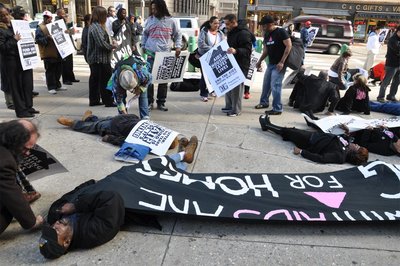About 60 members of ACT UP took to the streets Wednesday afternoon to speak up for the city’s HIV-positive homeless population, which they say is being largely ignored by the city.
The protest stemmed from a meeting Monday with Mayor Nutter, during which ACT UP members raised concerns about the city’s lengthy waiting list for housing funded by Housing Opportunities for People With AIDS.
ACT UP members brought to the meeting a statement, signed by 75 area health officials, that calls for the city to work to end the waiting list for the housing program, overseen by the city’s AIDS Activities Coordinating Office, and for AACO to expand the housing-eligibility requirements for the program.
The contingent also outlined a plan to stem the tide of homeless among HIV-positive individuals that it developed with students from the University of Pennsylvania’s Urban Planning program, which includes streamlining services and garnering new funding outlets.
“We presented him with a plan, we showed him the costs, the savings and how it’s cost-effective to house people with AIDS as opposed to sending them to shelters,” said ACT UP member Jose DeMarco. “But he said he can’t commit to anything like that right now because of budgetary reasons. He says there’s no money, but we know he’s given huge corporate tax breaks and we know that there is money and that there is a way for him to do this. We were heartbroken with how this meeting turned out.”
Cliff Williams, an ACT UP member who is HIV-positive and has experienced homelessness, said he believes the issue comes down to politics.
“[The mayor] lives in a political world, and HIV doesn’t fit into that world. Since HIV is not part of politics, it doesn’t fit into whatever budgetary plans they have for the city,” Williams said.
This past summer, ACT UP released a report that found the city’s waiting list for HIV/AIDS housing stood at more than 200 people, which represented a 30-percent increase from the beginning of the year.
In the past year-and-a-half, DeMarco said at least six homeless individuals who had HIV or AIDS died on the streets.
Williams said the city needs to take targeted steps, like those proposed by ACT UP, to keep this number from continuing to rise.
Williams became homeless in 2004 and spent several years living on the streets and in shelters. Although he said AACO did eventually connect him with social-service agency COMHAR, which helped him find housing, his story is rare.
“The same people who were homeless back in 2004 are still out there and are still homeless,” he said. “People are dying, and no one’s doing anything to stop it.”
When he found himself homeless, Williams sought assistance from the city’s shelter system, but said the conditions were hardly better than on the streets.
On two separate occasions, Williams had his HIV medications stolen and once had his health further compromised after coming down with scarlet fever.
“In the shelter system, you sleep on cots and you’re basically inches apart from someone else,” he said. “Sometimes they keep the air conditioning on when it’s cold out and say it’s to keep the germs down, but for someone who already has a compromised immune system, a group setting like that is not a good environment to be in.”
Williams said he frequently was the target of gossip and ridicule by staffers at the shelters, whom he said spread the word that he was HIV-positive, leaving him further stigmatized and isolated.
Williams and his wife, who was also HIV-positive, were on AACO’s waiting list for housing, but his wife passed away in February 2009. He said he was forced to re-sign up for the list after her death on his own, delaying his connection to housing even longer.
Now that he has attained housing, Williams said his quality of life has improved greatly.
“When a person is homeless and they’re HIV-positive, they basically have no base to work from. It’s hard to look for work, get your life together, maintain your medications without someplace to come home to,” he said. “When you have housing, you feel like somebody. You’re able to function in this world. Right now, our youth are being affected by this, our seniors are being affected by this, everyone’s being affected, and if the city doesn’t step up, it’s just going to keep getting worse.”
Jen Colletta can be reached at [email protected].
